|
|
Posted 3/1/2016 (link)
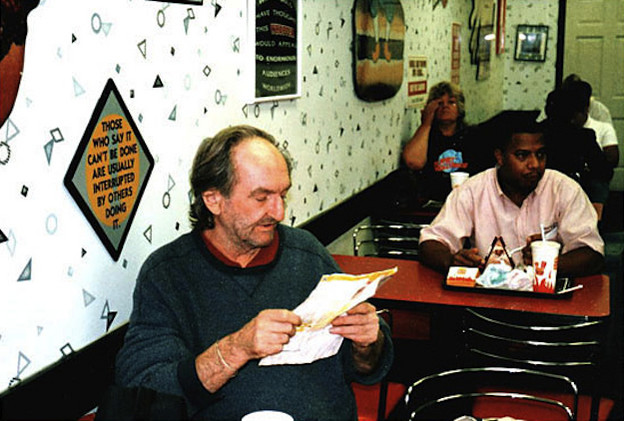 I was reminded today, by a wonderful Facebook post by Jim Dunn, that March 1st was the twelfth anniversary of the passing of John Wieners, a singular talent beloved from coast to coast. It's a great opportunity for our listeners to reacquaint themselves with the recordings available on PennSound's Wieners author page.
Our earliest recordings include a trio from 1965: Wieners' July 14th set at the Berkeley Poetry Conference, another July reading possibly in Berkeley, and a brief recording from SUNY-Buffalo that September. Next, we have a October 1966 event from the 92nd Street Y's Unterberg Poetry Center and a pair of long recordings made at SUNY-Buffalo in 1967 and at the St. Mark's Poetry Project in 1968. Following that we have a wonderful conversation with Walter Lowenfels, Lillian Lowenfels, and Alan DeLoach in March 1969 and two recordings from Boston in 1972: two days' worth of visits to Robert Creeley's ENG-1670 class at Harvard and a short appearance on WBCN-FM.
Jumping forward to the 1980s, there are two tracks from The World Record: Readings at the St. Mark's Poetry Project, 1969-1980 and three poems recorded at Brooklyn College in 1988. The next decade starts in grand fashion with a pair of recordings from the spring of 1990: the first in San Francisco, followed by an appearance at the St. Mark's Poetry Project. There's another Poetry Project set from the fall of 1996, and an October 1999 reading at the Guggenheim to round things out.
I also happily recommend that interested listeners check out the Wieners component of Jim Dunn and Kevin Gallagher's ambitious Jacket2 feature, Mass: Raw Poetry from the Commonwealth of Massachusetts," which we published in December 2012. As Dunn observes in today's note, "The world is catching up and recognizing finally the pure beauty and genius of his work. Wish He was here to enjoy it." I couldn't agree more.
Posted 3/4/2016 (link)
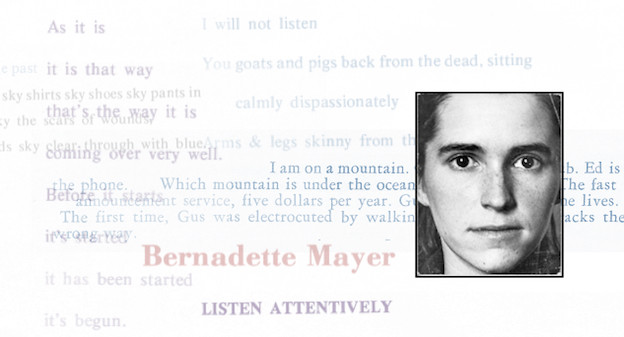 This week brought a very exciting new publication in Jacket2: edited by Michael Ruby and Sam Truitt, "Thirteen Poems by Bernadette Mayer" offers up exactly that, along with a critical introduction and discussion of each of the poems. Here's how their preface begins:
"These poems come from Bernadette Mayer's long-unpublished early book, The Old Style Is Finding out Something about a Whole New Set of Possibilities, which was written mostly from 1966 to 1970, when Mayer was between the ages of twenty-one and twenty-five. Unlike the majority of the poems in the book, they were never published in any form until their appearance in Eating the Colors of a Lineup of Words: The Early Books of Bernadette Mayer (Station Hill Press, 2015), which we coedited. When Mayer began The Old Style, she was a student at the New School for Social Research in Manhattan, taking poetry classes from Bill Berkson. She had met or at least seen many of the New York School poets, including John Ashbery and Frank O'Hara. She was launching the journal 0 to 9 with Vito Acconci, who was married to her older sister, Rosemary, and who had known the orphan Mayer sisters since the late 1950s. The first issue of 0 to 9 was printed in April 1967, not long before Mayer graduated from the New School."
You can read the rest, along with the thirteen poems, here and while you're at it, don't forget to check out PennSound's Bernadette Mayer author page, where, among many other recordings you can listen to "Complete Music of Webern, A Movie" (taken from the 1969 audio collection, Tape Poems, edited by Eduardo Costa and John Perreault), a fascinating rendition of one of the poems presented in the Jacket2 feature with audio embellishment.
Posted 3/7/2016 (link)
 We're starting this new week off with a new two-part Close Listening program featuring Julie Patton.
For the first program, in the words of host Charles Bernstein, Patton "reads, performs and rips" four pieces in total: "Car Tune," "Using Blue to Get Black," "Scribbling thru the Times," and "Notes for Sum (Nominally) Awake." Then, for the second show, the two discuss "growing up in an art-rich home and community in Cleveland, the influence of her artist-mother and the Cleveland art, performance, and poetry scenes on her early development as a poet/artist/performer; her move to New York and travel in Europe, her approach to writing as physical and acoustic media, her developing style of improvised performance, and her visual art." Patton also discusses "Using Blue to Get Black" from the first show, exploring "the politics of the form" — "As Patton puts it, 'I'm not black, I'm blue.'"
Bernstein notes in his Jacket2 commentary post announcing the show that these are the 139th and 140th shows in Close Listening's thirteen-year history. You can browse all of those programs on PennSound's Close Listening series page and for more Julie Patton, click here.
Posted 3/8/2016 (link)
 March 8th is widely celebrated as International Women's Day, "a global day celebrating the social, economic, cultural and political achievements of women," which has been observed for more than a century. Specifically, this year's focus is on gender parity. As the campaign notes, "The World Economic Forum predicted in 2014 that it would take until 2095 to achieve global gender parity. Then one year later in 2015, they estimated that a slowdown in the already glacial pace of progress meant the gender gap wouldn't close entirely until 2133."
To acknowledge the day, I've made this modest list of just some of the women who make our world of contemporary poetry an exciting one — whether through their perspectives, their formal inventiveness, or the examples they set for younger generations of authors. Though it's a small gesture, why not click on one of the links below, listen to a poem or two, and perhaps discover a new poetic voice or ruminate on the ways in which an old favorite author has shaped your own poetic practice:
Caroline Bergvall / Mei-mei Berssenbrugge / Anne Boyer / Tisa Bryant / Julie Carr / Brenda Coultas / Rachel Blau DuPlessis / Elaine Equi / Susan Howe / Bhanu Kapil / Sueyeun Juliette Lee / Kate Lilley / Dawn Lundy Martin / Pattie McCarthy / Erin Mouré / Trace Peterson / Claudia Rankine / Cia Rinne / Reina María Rodríguez / Jennifer Scappettone / Prageeta Sharma / Evie Shockley / Stacy Szymaszek / Mónica de la Torre / Cecilia Vicuña
Again, this is just a very small list of living poets — and a difficult one to make at that — so no conclusions should be drawn from who is or isn't included. To find even more of the voices defining contemporary poetry, why not visit our index of authors?
Posted 3/9/2016 (link)
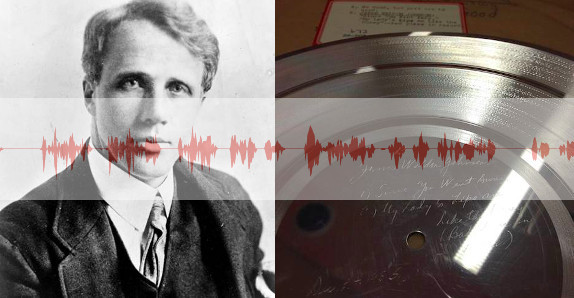 It's a very exciting week for us at PennSound as we launch our new Robert Frost author page. Chris Mustazza, who brought the recordings to us, has the scoop in a new Jacket2 commentary post: As part of my work to excavate, digitize, and contextualize one of the first poetry audio archives in US, The Speech Lab Recordings, I'm thrilled to announce a significant addition to the collection: new digitizations of previously unreleased Robert Frost recordings, made in the Speech Lab in 1933 and 1934.
These recordings, which may be the first recordings ever made of Frost, in one sense mark a departure from the aesthetic circumscription of the collection. Many of the poets who were recorded in Professors W. Cabell Greet and George W. Hibbitt's Columbia University lab built for the study of American dialects operated in a modernist tradition of formal innovation. From the collection's founding with the performance-forward, Dada-esque incantations of Vachel Lindsay through James Weldon Johnson's Afro-Modernist scoring of speech sounds and Gertrude Stein's proto-Language poetics, it's clear that the editors favored a particular strain of modernism.
But while Frost is known for his use of and variation upon traditional forms and rhyme schemes, his poetics do bear affinities to those of the more formally innovative poets recorded in the series, most especially his interest in the aural properties of the poem. You can read more of his detailed intro here. The two sessions archived here were made in 1933 and 1934 and include iconic poems like "Stopping By the Woods on a Snowy Evening," "Mending Wall," and "The Road Not Taken" along with "Dust of Snow," "Once by the Pacific," "Mowing," "Spring Pools," "Birches," "The Grindstone," "The Runaway," and "An Old Man's Winter Night," along with two takes of "The Code," which Mustazza singles out in his notes. To start listening, click the title above to visit PennSound's Robert Frost author page.
Posted 3/14/2016 (link)
 We're very glad to be able to continue to share recent recordings from the monthly reading series held by Tinfish Press — Susan M. Schultz's Hawai'i-based publishing house dedicated to highlighting "experimental poetry (and some prose) from the Pacific." Our most recent addition was recorded on February 1, 2016 at Na Mea Hawai`i in Honolulu and features a trio of poets: Tim Dyke, Joseph Han, and Bob Holman, with the first two authors delivering short opening sets and headliner Holman reading for half an hour.
This latest recording joins a handful of earlier recordings in the series that includes contributions from Jay Vera Lee, Lynn Young, Jules Boykoff, Kaia Sand, Brandy Nalani McDougall, Bryant Webster Schultz, Janine Oshiro, No'u Revilla, Adam Aitken, and Kai Gaspar, and Schultz herself, among others.
To start listening, click here.
Posted 3/16/2016 (link)
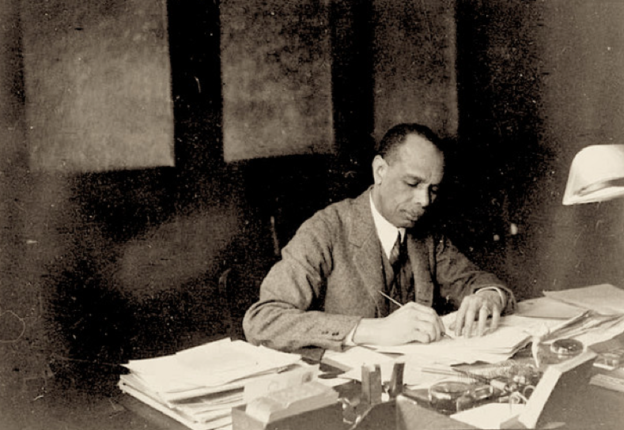 Yesterday we released the ninety-eigth episode in the PoemTalk Podcast series. For this program host Al Filreis leads a panel including Herman Beavers, Salamishah Tillet, and Chris Mustazza through a discussion of James Weldon Johnson's poem "O Southland!"
Filreis begins his introduction on the PoemTalk blog with the poem's provenance: "'O Southland!' was published in The Independent in 1907 and again in W. E. B. DuBois's Horizon in 1908, and was probably first encountered by most of Johnson's contemporary readers in his book Fifty years & other poems (1917) or in The Book of American Negro Poetry (1922), which Johnson himself edited." From there he moves on to "the depth of Johnson?s rhetorical, idiomatic, metrical, and strategic influence on civil rights in later decades." You can read more on Jacket2.
PoemTalk is a co-production of PennSound, the Kelly Writers House, Jacket2 and the Poetry Foundation. If you're interested in more information on the series or want to hear our archives of previous episodes, please visit the PoemTalk blog, and don't forget that you can subscribe to the series through the iTunes music store.
Posted 3/17/2016 (link)
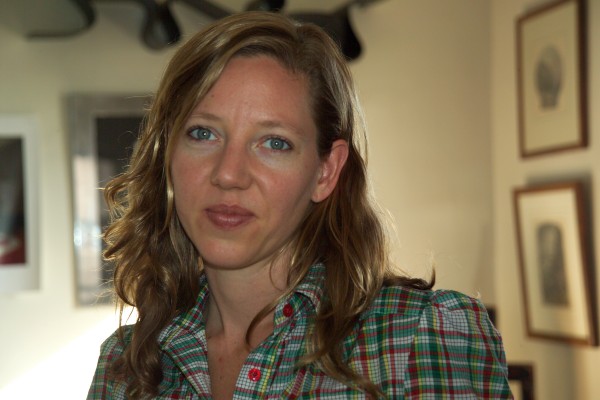 We send our congratulations to Maggie Nelson, who just won the National Book Critics Circle Award for Criticism for her astounding work of "autotheory," The Argonauts.
If you'd like a thorough introduction to the book, we recommend you check out Nelson's conversation with David Naimon on his KBOO-FM literary series Between the Covers, which was originally broadcast on July 29, 2015. Here's Naimon's description of the program:
"An intrepid voyage out to the frontiers of the latest thinking about love, language, and family. Maggie Nelson binds her personal experience, the story of her relationship with the fluidly-gendered artist Harry Dodge, to a rigorous exploration of what iconic theorists have said about sexuality, gender, and the vexed institutions of marriage and child-rearing. The Argonauts is a genre-bending memoir offering fresh, fierce, and timely thinking about desire, identity, and the limitations and possibilities of love and language, offering a firsthand account of the complexities and joys of (queer) family-making."
You can listen to this program by clicking on the title above, which will take you to PennSound's Maggie Nelson author page. There, you'll also find a 2013 reading as part of the Boise State MFA reading series, a pair of 2008 readings from the Key West Literary Seminar, a 2007 appearance on LA Lit, a 2003 set for the Belladonna* reading series, and finally, a 2001 Segue Series reading at Double Happiness, many of which have been segmented. Taken together, they offer a broad survey of Nelson's work from her early poetry collections through to her more recent hybrid volumes.
Posted 3/28/2016 (link)
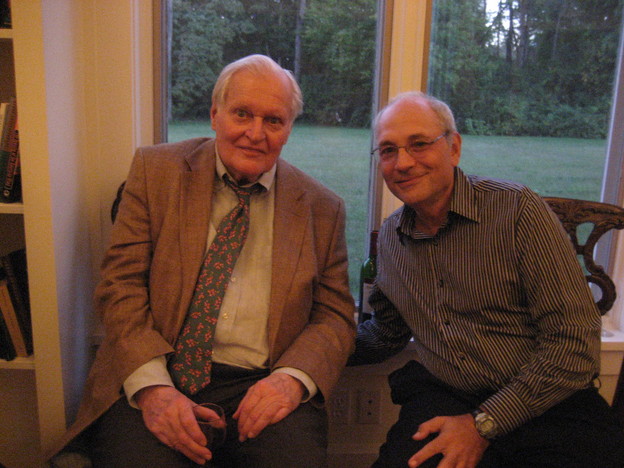 Here's a brand new and very exciting episode from the Close Listening series featuring two living legends in conversation: the one and only John Ashbery in conversation with host Charles Bernstein.
Recorded on March 18, 2016 this show breaks with the regular format, consisting of a single twenty-eight minute program dedicated solely to discussion. Here's how Bernstein describes the proceedings in a recent Jacket2 commentary post: "Ashbery talks about his two shows of collages at Tibor de Nagy gallery and the relation of these collages to his poetry; about his engagement with French poetry, including the work of Pierre Martory, Giorgio de Chirico , and Raymond Roussel; and about his love of television cooking shows." Bernstein also raises the interesting question of whether Burroughs' and Gysin's early cut-up practice (taking place in Paris at approximately the same time) had influenced Ashbery's collage work, and fans of "The Skaters" or "They Dream Only of America" will enjoy the brief discussions of those works here.
This latest Close Listening program is the 148th in the series' history. You can browse its broad and impressive archives here, while our Ashbery author page — certainly one of the collections we're most proud of — can be found here
Posted 3/30/2016 (link)
 Back in January we announced a Teach-In at the Kelly Writers House in honor of Palestinian poet Ashraf Fayadh who had been sentenced to death in Saudi Arabia on Nov. 17th, 2015 for the "crime" of apostasy. Aside from renouncing Islam, Fayadh stood accused of blaspheming and promoting atheism through his collection of poetry, Instructions Within, first published in 2008.
Held as part of a series of international "Life & Freedom for Ashraf Fayadh Worldwide Reading[s]", our local event featured poets Rachel Blau DuPlessis, Ron Silliman, Julia Bloch, and Ariel Resnikoff, along with host Charles Bernstein. After Bernstein's introduction, Silliman read excerpts from Instructions Within for which Fayadh had been sentenced to death by the Saudi courts. Next Bloch, DuPlessis, and Resnikoff read individual poems in translation (by Johnathan Wright and Tariq al Haydar), which accompanied readings in the original Arabic.
You can now listen to segmented tracks of this event here, and to learn more about Fayadh (via PEN International), click here.
|
PennSound Daily archive
2025
2024
2023
2022
2021
2020
2019
2018
2017
2016
2015
2014
2013
2012
2011
2010
2009
2008
2007
|







